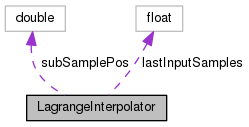Interpolator for resampling a stream of floats using 4-point lagrange interpolation.
More...
#include <juce_LagrangeInterpolator.h>
|
| | LagrangeInterpolator () noexcept |
| |
| | ~LagrangeInterpolator () noexcept |
| |
| int | process (double speedRatio, const float *inputSamples, float *outputSamples, int numOutputSamplesToProduce) noexcept |
| | Resamples a stream of samples. More...
|
| |
| int | processAdding (double speedRatio, const float *inputSamples, float *outputSamples, int numOutputSamplesToProduce, float gain) noexcept |
| | Resamples a stream of samples, adding the results to the output data with a gain. More...
|
| |
| void | reset () noexcept |
| | Resets the state of the interpolator. More...
|
| |
Interpolator for resampling a stream of floats using 4-point lagrange interpolation.
Note that the resampler is stateful, so when there's a break in the continuity of the input stream you're feeding it, you should call reset() before feeding it any new data. And like with any other stateful filter, if you're resampling multiple channels, make sure each one uses its own LagrangeInterpolator object.
- See also
- CatmullRomInterpolator
◆ LagrangeInterpolator()
| LagrangeInterpolator::LagrangeInterpolator |
( |
| ) |
|
|
noexcept |
◆ ~LagrangeInterpolator()
| LagrangeInterpolator::~LagrangeInterpolator |
( |
| ) |
|
|
noexcept |
◆ process()
| int LagrangeInterpolator::process |
( |
double |
speedRatio, |
|
|
const float * |
inputSamples, |
|
|
float * |
outputSamples, |
|
|
int |
numOutputSamplesToProduce |
|
) |
| |
|
noexcept |
Resamples a stream of samples.
- Parameters
-
| speedRatio | the number of input samples to use for each output sample |
| inputSamples | the source data to read from. This must contain at least (speedRatio * numOutputSamplesToProduce) samples. |
| outputSamples | the buffer to write the results into |
| numOutputSamplesToProduce | the number of output samples that should be created |
- Returns
- the actual number of input samples that were used
◆ processAdding()
| int LagrangeInterpolator::processAdding |
( |
double |
speedRatio, |
|
|
const float * |
inputSamples, |
|
|
float * |
outputSamples, |
|
|
int |
numOutputSamplesToProduce, |
|
|
float |
gain |
|
) |
| |
|
noexcept |
Resamples a stream of samples, adding the results to the output data with a gain.
- Parameters
-
| speedRatio | the number of input samples to use for each output sample |
| inputSamples | the source data to read from. This must contain at least (speedRatio * numOutputSamplesToProduce) samples. |
| outputSamples | the buffer to write the results to - the result values will be added to any pre-existing data in this buffer after being multiplied by the gain factor |
| numOutputSamplesToProduce | the number of output samples that should be created |
| gain | a gain factor to multiply the resulting samples by before adding them to the destination buffer |
- Returns
- the actual number of input samples that were used
◆ reset()
| void LagrangeInterpolator::reset |
( |
| ) |
|
|
noexcept |
Resets the state of the interpolator.
Call this when there's a break in the continuity of the input data stream.
◆ lastInputSamples
| float LagrangeInterpolator::lastInputSamples[5] |
|
private |
◆ subSamplePos
| double LagrangeInterpolator::subSamplePos |
|
private |
The documentation for this class was generated from the following file:
